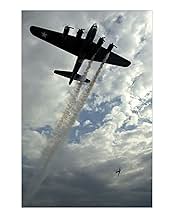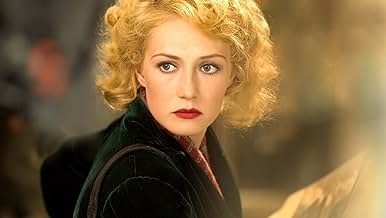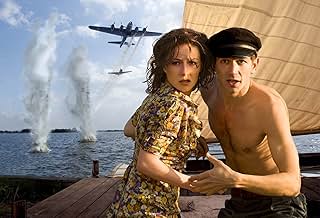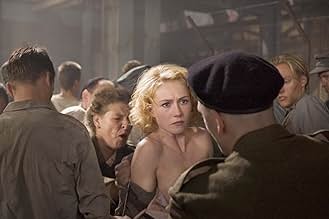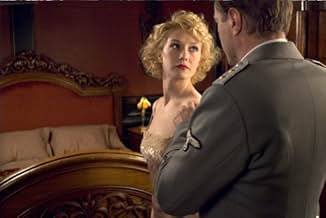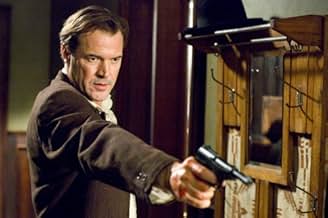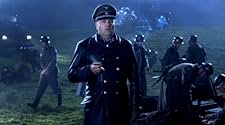In den von den Nazis besetzten Niederlanden während des Zweiten Weltkriegs infiltriert ein jüdischer Sänger das regionale Gestapo-Hauptquartier für den niederländischen Widerstand.In den von den Nazis besetzten Niederlanden während des Zweiten Weltkriegs infiltriert ein jüdischer Sänger das regionale Gestapo-Hauptquartier für den niederländischen Widerstand.In den von den Nazis besetzten Niederlanden während des Zweiten Weltkriegs infiltriert ein jüdischer Sänger das regionale Gestapo-Hauptquartier für den niederländischen Widerstand.
- Nominiert für 1 BAFTA Award
- 13 Gewinne & 23 Nominierungen insgesamt
Empfohlene Bewertungen
It took me about an hour after having seen the film to find any enthusiasm to write this review. The film Black Book, or Zwartboek in Dutch, is very impressive, with an excellent feeling for the complexity of inter-human relationships.
The story is about a Jewish girl that finds herself in a powerless situation in a war that tends to bring out the worst in all, 'good' or 'bad'. So much for what we know without seeing the film for ourselves. The film starts out rather typical, informing us with what we already new about the war: people where poor, hungry and trying to survive. However, the second part of the film shows a less well known part of Dutch resistance history: that the war brings out the worst in everybody. Without losing sight of the importance of the resistance against the foreign repression, Paul Verhoeven confuses his audience by visualizing how ones own well-being seems to go at the cost of the well-being of another. No black and white, no bad or good, but only the individual choice, that is tormented by the will to survive and a feeling for morality.
The film is daring for showing the dark side of the Dutch national history. However, the most valuable of the film is that it captivates its audience and sensitizes its audience for the misery of the historical event of World War II, but also the contemporary difficulties that affects human beings rather than countries. A must see, even though it makes you feel miserable.
The story is about a Jewish girl that finds herself in a powerless situation in a war that tends to bring out the worst in all, 'good' or 'bad'. So much for what we know without seeing the film for ourselves. The film starts out rather typical, informing us with what we already new about the war: people where poor, hungry and trying to survive. However, the second part of the film shows a less well known part of Dutch resistance history: that the war brings out the worst in everybody. Without losing sight of the importance of the resistance against the foreign repression, Paul Verhoeven confuses his audience by visualizing how ones own well-being seems to go at the cost of the well-being of another. No black and white, no bad or good, but only the individual choice, that is tormented by the will to survive and a feeling for morality.
The film is daring for showing the dark side of the Dutch national history. However, the most valuable of the film is that it captivates its audience and sensitizes its audience for the misery of the historical event of World War II, but also the contemporary difficulties that affects human beings rather than countries. A must see, even though it makes you feel miserable.
Director Paul Verhoeven's self-confessed aim is to combine art and business, appeal to a broad audience, and yet still have some endurance. The fame of films like Basic Instinct and Total Recall is lasting, yet they court criticism with their use of sexuality or by playing to the (easily dismissible) sci-fi genre. Graphic sex and violence are common in his movies and, when you add the occasional major flop such as Showgirls, the work of Verhoeven often fails to be taken seriously. Yet Black Book deserves respect. It is a wartime resistance movie on an epic scale, freed of the conventions of British and American war movies, yet bringing their typically high production values to a uniquely Dutch film.
Israel 1956. A Holy Land Tours bus stops off at a Kibbutz. One of the passengers recognises a teacher there, Rachel, from times they had shared during the war. As her friend leaves, Rachel thinks back to Holland in 1944. She was an accomplished cabaret singer but also Jewish. She was in hiding, waiting for the war to end. But chance misfortune means she has to try to make a getaway with some other Jewish people. They are ambushed, and she is almost shot. A little later she starts working for the resistance ('terrorists' as the Nazis call them) and infiltrates the Gestapo, seducing a high ranking officer called Muntze.
What follows is a frantic game of cat and mouse, espionage and counter-espionage. Rachel (now called Ellis) is torn between the horrors inflicted on her friends close-by and the elaborate deceits she tries to play to save them. Gradually it becomes clear that Muntze, anticipating the end of the war, is risking his neck to try to minimize death and suffering on both sides, and one or more of the resistance fighters is selling out to the Nazis to reap rich profits. Muntze, like Rachel, has had to overcome great losses. Their humanity is a bridge that brings them closer.
Rachel/Ellis is played by Carice van Houten, a leading actress of the Dutch screen. Her presence is luminous and charismatic (for British/American audiences, there is the curious sensation of watching someone unknown who radiates star quality with every breath). Her character has to adapt to many contrasting situations yet there is an underlying determination and fast thinking that shines through and makes such changes seem in character and unscripted. We share her emotional struggle and watch her pit her wits against the Gestapo (who are not exactly stupid). The movie is worth seeing for her performance alone.
On the one hand, the film has been minutely researched, based on actual events and characters; on the other it still has the slightly larger than life gloss we might associate, say, with a James Bond film. The escapes are in the nick of time, the sex scenes are steamy, and the plot twists increase exponentially as we get closer to the end.
Not content to portray the unique conditions of Holland during the occupation, Black Book goes on to catalogue post war atrocities and Rachel's eventual journey to Israel. The style and delivery will not appeal to everyone, but Black Book is Verhoeven on top form, delivering grand entertainment that shows his talents (and those of the remarkable Carice van Houten) at their finest.
Israel 1956. A Holy Land Tours bus stops off at a Kibbutz. One of the passengers recognises a teacher there, Rachel, from times they had shared during the war. As her friend leaves, Rachel thinks back to Holland in 1944. She was an accomplished cabaret singer but also Jewish. She was in hiding, waiting for the war to end. But chance misfortune means she has to try to make a getaway with some other Jewish people. They are ambushed, and she is almost shot. A little later she starts working for the resistance ('terrorists' as the Nazis call them) and infiltrates the Gestapo, seducing a high ranking officer called Muntze.
What follows is a frantic game of cat and mouse, espionage and counter-espionage. Rachel (now called Ellis) is torn between the horrors inflicted on her friends close-by and the elaborate deceits she tries to play to save them. Gradually it becomes clear that Muntze, anticipating the end of the war, is risking his neck to try to minimize death and suffering on both sides, and one or more of the resistance fighters is selling out to the Nazis to reap rich profits. Muntze, like Rachel, has had to overcome great losses. Their humanity is a bridge that brings them closer.
Rachel/Ellis is played by Carice van Houten, a leading actress of the Dutch screen. Her presence is luminous and charismatic (for British/American audiences, there is the curious sensation of watching someone unknown who radiates star quality with every breath). Her character has to adapt to many contrasting situations yet there is an underlying determination and fast thinking that shines through and makes such changes seem in character and unscripted. We share her emotional struggle and watch her pit her wits against the Gestapo (who are not exactly stupid). The movie is worth seeing for her performance alone.
On the one hand, the film has been minutely researched, based on actual events and characters; on the other it still has the slightly larger than life gloss we might associate, say, with a James Bond film. The escapes are in the nick of time, the sex scenes are steamy, and the plot twists increase exponentially as we get closer to the end.
Not content to portray the unique conditions of Holland during the occupation, Black Book goes on to catalogue post war atrocities and Rachel's eventual journey to Israel. The style and delivery will not appeal to everyone, but Black Book is Verhoeven on top form, delivering grand entertainment that shows his talents (and those of the remarkable Carice van Houten) at their finest.
I must admit that I don't like to watch dutch movies that much. Most of the time the acting is pretty bad and if they use some kind of cgi in the movies its one from the 1980's.
This movie really surprised me. Quite good acting from most of the actors. And the general view of the Alliance is good and the Germans are bad isn't presented. The movie shows both sides, the good the bad (and the ugly) behaviors of the people during the war.
Although he didn't have a very big budget to make this movie (between 16-20 million dollars) which is nothing for Hollywood matters, he'd made quite a good movie from it.
If you want to watch a movie about WWII that isn't like most of the movies made about this war, go and watch this one. You wont be bored for the next 2,5 hours.
This movie really surprised me. Quite good acting from most of the actors. And the general view of the Alliance is good and the Germans are bad isn't presented. The movie shows both sides, the good the bad (and the ugly) behaviors of the people during the war.
Although he didn't have a very big budget to make this movie (between 16-20 million dollars) which is nothing for Hollywood matters, he'd made quite a good movie from it.
If you want to watch a movie about WWII that isn't like most of the movies made about this war, go and watch this one. You wont be bored for the next 2,5 hours.
I attended the North American premiere of "Black Book" at the Toronto International Film Festival. Although my main interest lies in independent film, and I did see many indies as well as foreign films and documentaries in Toronto, I also saw a few of the "Gala" selections. Of those "big movies" on my list, the one which impressed me the most was this Dutch production from Paul Verhoeven. Set in Nazi-occupied Holland during World War II, the film centers around a young Jewish woman named Rachel, who changes her name (and hair, and personality, and more) to Ellis and enters an odyssey of determination and sheer luck in an effort to survive what would otherwise be certain death.
Make no mistake about it: this is an epic in the true sense of the word. The visuals are stunning. Everything about the production from the sound to the effects to the score says "big budget." The story is chock full of more twists and turns than just about any film I've seen in this genre. And just when you think that, perhaps, Verhoeven is beginning to stretch the bounds of credulity, you realize (at the end credits, if not before) that "Black Book" is based on fact.
Most of all, the film's power is due to the magnificent acting of Carice van Houten. Her Rachel/Ellis is a character so unique, so original, that it holds up against the great heroines of contemporary cinema. Combine her marvelous performance with a wonderful story and superb production values and you end up with a thrill ride from start to finish. "Black Book" left me breathless.
Make no mistake about it: this is an epic in the true sense of the word. The visuals are stunning. Everything about the production from the sound to the effects to the score says "big budget." The story is chock full of more twists and turns than just about any film I've seen in this genre. And just when you think that, perhaps, Verhoeven is beginning to stretch the bounds of credulity, you realize (at the end credits, if not before) that "Black Book" is based on fact.
Most of all, the film's power is due to the magnificent acting of Carice van Houten. Her Rachel/Ellis is a character so unique, so original, that it holds up against the great heroines of contemporary cinema. Combine her marvelous performance with a wonderful story and superb production values and you end up with a thrill ride from start to finish. "Black Book" left me breathless.
Saw it at Toronto Int. Film Festival with Paul Verhoeven and Carice van Houten on stage. This movie has Verhoeven's trademark stamp all over it. It's evident this film was a more personal project for him. Non stop action and good acting, especially from the lead actress, Carice van Houten. I've seen other films (American and French) about Resistance fighters during WWII, but non of them gripped me by the throat like this one. I admit Verhoeven is at times a bit heavy-handed, especially the sound effects of German machine guns, but the story never sags. It's a "By the seat of your pants" type of movie. After you leave the theater, the impact of the story stays with you for days. Go and see it when it comes to your local cinema in North America. I highly recommend it.
Wusstest du schon
- WissenswertesMost actors speak more than one language in the film. Carice van Houten speaks four languages fluently in the course of the film: Hebrew in the scenes in Israel, German with Nazi soldiers, English with Canadian army personnel and Dutch for the majority of the film.
- PatzerInsulin, even injected directly into the blood stream, would not act as fast as shown to lower blood sugar.
- Zitate
Rachel Stein aka Ellis de Vries: I never knew this would happen. To fear the liberation...
- VerbindungenEdited into Zwartboek: The Special (2006)
- SoundtracksIch bin die fesche Lola
Music by Friedrich Hollaender (as Friedrich Hollaender)
Lyrics by Robert Liebmann
Performed by Carice van Houten
(c) 1930 by Ufaton-verlagsgesellschaft mbH (BMG Music Publishing Germany), Munich
Top-Auswahl
Melde dich zum Bewerten an und greife auf die Watchlist für personalisierte Empfehlungen zu.
Details
- Erscheinungsdatum
- Herkunftsländer
- Offizielle Standorte
- Sprachen
- Auch bekannt als
- Das schwarze Buch
- Drehorte
- Produktionsfirmen
- Weitere beteiligte Unternehmen bei IMDbPro anzeigen
Box Office
- Budget
- 21.000.000 $ (geschätzt)
- Bruttoertrag in den USA und Kanada
- 4.398.532 $
- Eröffnungswochenende in den USA und in Kanada
- 112.521 $
- 8. Apr. 2007
- Weltweiter Bruttoertrag
- 26.768.563 $
- Laufzeit2 Stunden 25 Minuten
- Farbe
- Sound-Mix
- Seitenverhältnis
- 2.35 : 1
Zu dieser Seite beitragen
Bearbeitung vorschlagen oder fehlenden Inhalt hinzufügen



